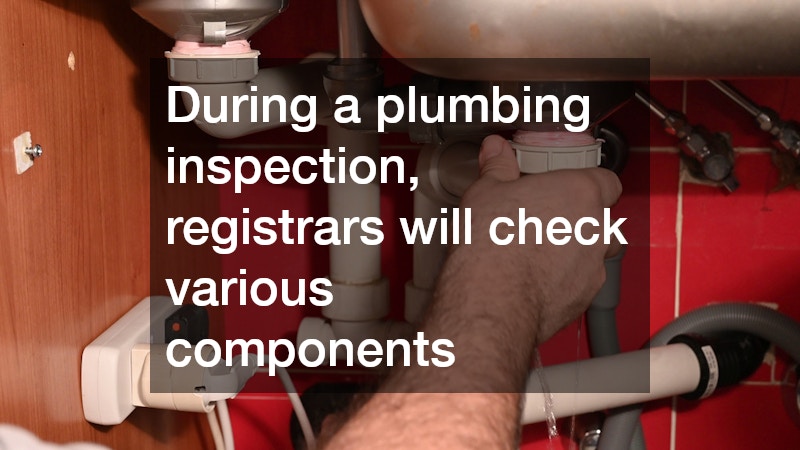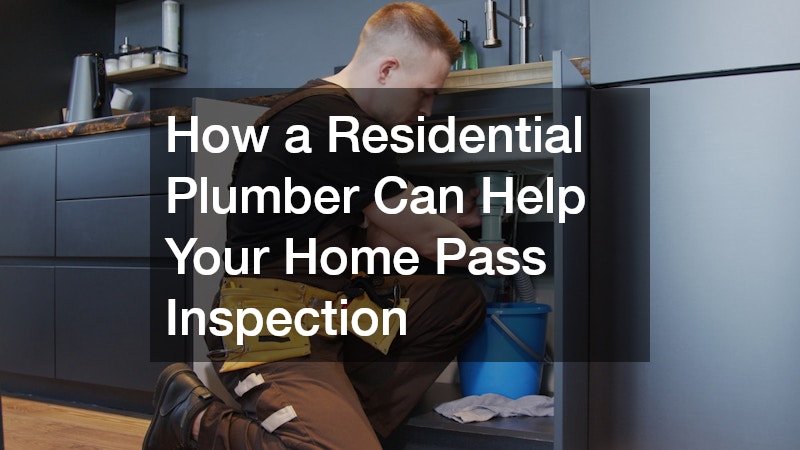Explore the vital role a residential plumber plays in ensuring that your home meets inspection requirements. From addressing common plumbing issues to providing essential maintenance, a knowledgeable plumber can be your best ally in passing home inspections.
Common Plumbing Issues That Can Fail an Inspection
Leaks, whether they are subtle drips or major bursts, can lead to significant damage and ultimately result in failed inspections. Even minor leaks can be indicative of larger issues, such as pipe deterioration or improper installation.
Catching these problems early is crucial for maintaining a passable inspection status.
Pipe corrosion is another common issue that may not seem urgent but can affect your plumbing system’s integrity over time. Corroded pipes can lead to leaks that can cause water damage, mold growth, and more extensive repairs down the road. Thus, understanding the signs of corrosion and having a plumber assess your system regularly is essential for passing inspections.
Lastly, faulty fixtures such as faucets and toilets can cause water wastage or hygiene issues. When inspectors look at plumbing systems, they will check for proper functioning and compliance with current plumbing codes. If any fixtures are found to be faulty or outdated, it can result in a failed inspection, emphasizing the need for routine evaluations by a qualified plumber.
How a Plumber Prepares Your Home for Inspection
A reputable plumber will start with a comprehensive evaluation of your entire plumbing system to identify any potential issues that could arise during an official inspection. This proactive approach can save you time and money by addressing concerns beforehand.
In addition to identifying existing problems, skilled plumbers can offer solutions that align with local codes. They often stay updated with local regulations and standards, ensuring that necessary repairs are made according to those rules. Timely adjustments or replacements can be crucial for meeting compliance and ensuring a smooth inspection process.
Additionally, a plumber can assist in preparing documentation and records that might be required for inspection. Having the right paperwork at hand can make the inspection process more straightforward. This might mean confirming that specific repairs were made according to code and that all fixtures have been appropriately updated.
Plumbing Codes to Comply With
Plumbing codes vary by location but generally cover installation standards, materials used, and overall safety. Knowing what codes apply to your area can help you address issues proactively before an inspection.
Your local building department or plumbing board often provides guidelines or schedules for inspections, which can help homeowners understand their responsibilities. These codes might require specific piping materials, such as lead-free options, and proper venting systems to prevent hazardous situations. A residential plumber can help interpret these codes and ensure your plumbing systems align with them.
Understanding the plumbing codes in your area can also assist in avoiding unnecessary costs. If you fail to meet these regulations, it might result in fines or the need for costly rework. Working with a professional ensures that you are compliant from the start, minimizing the risk of delays or complications during your inspection.
How Regular Maintenance Prevents Inspection Issues
By scheduling routine maintenance, homeowners can identify potential plumbing problems before they escalate into significant issues that could jeopardize an inspection outcome. This proactive approach allows for timely repairs and ongoing system health checks.
Regular maintenance typically includes inspections of pipes, drainage systems, and fixtures to ensure everything is functioning correctly. Cleaning drains and inspecting for leaks are also critical services that maintain the integrity of your plumbing system. Homeowners often overlook these smaller tasks, but they play a pivotal role in meeting inspection standards.
Consistency in maintenance not only extends the lifespan of your plumbing but also gives you peace of mind about inspection outcomes. Knowing that your plumbing systems have been recently assessed and repaired by a qualified plumber can reduce the anxiety that often accompanies the inspection process.
What to Expect During a Plumbing Inspection
During a plumbing inspection, registrars will check various components like the water supply lines, drainage systems, and fixtures for functionality and compliance. Their checklist during the inspection will include whether fixtures work correctly without leaks and if all lines are adequately ventilated.
Inspectors may also assess the condition of pipes and other elements for signs of wear, damage, or deterioration. A well-trained plumber can help prepare your systems to meet inspection standards by ensuring everything works efficiently and is up to code. Plumbers can also accompany you during the inspection to answer any questions the inspector might have.
Homeowners should be ready to provide documentation, such as repair records or permits that might be necessary. Proper documentation can expedite the process and provide assurance to the inspector that the plumbing system has been well-maintained. Having a knowledgeable plumber available during the inspection can alleviate pressure and provide immediate responses to any issues that arise.
Hiring a residential plumber is an important step in preparing your home for inspection. They provide valuable insights and services that can prevent issues, ensuring your home passes inspection with ease. It is wise to consider plumbing inspections as an integral part of regular home maintenance, helping not just with current needs but also with long-term peace of mind.

